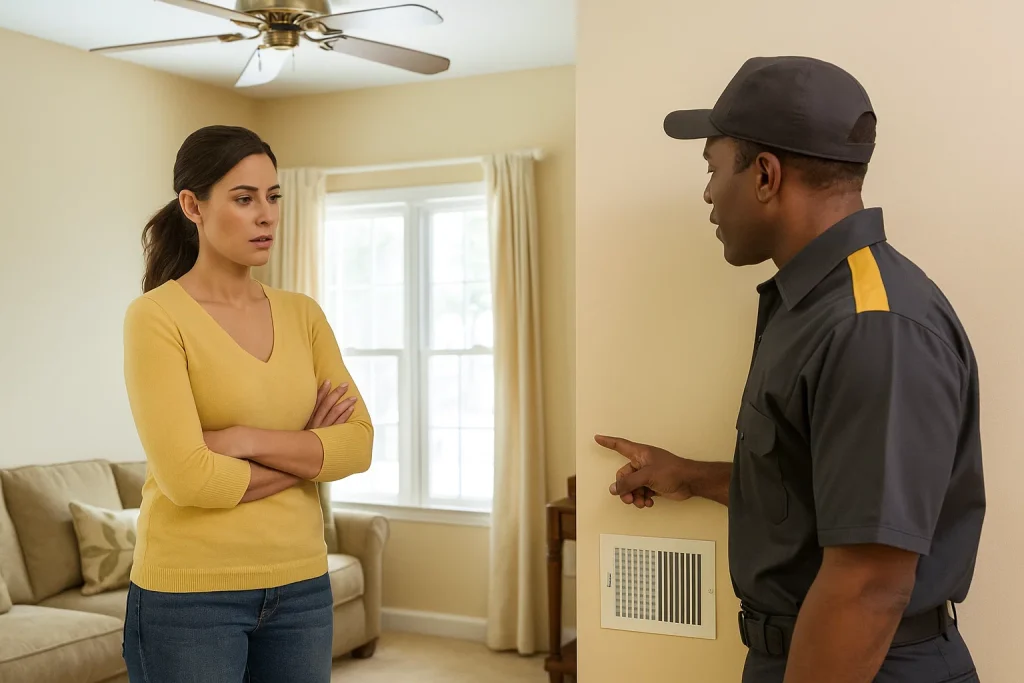On a hot or humid day, it may seem logical to close off vents in unused rooms, hoping to push more cool air into the spaces you actually use. Many homeowners assume that by shutting certain vents, they’ll redirect airflow and make their air conditioning more efficient. Unfortunately, this is a common misconception—and one that can actually create problems rather than solve them.

How Your HVAC System Works
Your air conditioning system is designed as a balanced, whole-home system. Every vent, duct, and register is part of a carefully sized network meant to distribute air evenly. When you close a vent, you’re not simply redirecting air somewhere else; instead, you’re disrupting the system’s airflow balance.
Think of your HVAC like a heart pumping blood through veins. If you pinch off one vein, you don’t get more blood in another—you create pressure that strains the system. The same concept applies to ductwork and vents.
Increased Pressure on the System
Closing vents increases static pressure within your ductwork. Air still needs somewhere to go, and when it’s blocked, the system has to work harder to push against the resistance. This added strain can:
- Force your blower motor to work beyond its intended capacity
- Cause leaks or damage in ductwork
- Lead to premature wear and tear on the system
In other words, what seems like a money-saving trick could shorten the life of your HVAC equipment.
Energy Inefficiency
Ironically, closing vents usually results in higher energy bills rather than savings. With restricted airflow, your system runs longer cycles, struggling to cool your home properly. You may notice inconsistent temperatures, with some rooms freezing while others remain uncomfortably warm. Instead of improving comfort, you end up wasting energy and money.
Risk of Frozen Coils and Other Problems
Another hidden danger is the potential for frozen evaporator coils. When airflow is restricted, the cold refrigerant in the coil isn’t warmed by enough return air. This can cause ice buildup, which not only reduces cooling efficiency but can also shut down your system entirely. A service call to thaw and repair frozen coils is far more costly than simply keeping vents open.
Better Alternatives to Improve Cooling
If your goal is to keep your home cooler and more efficient during hot, humid days, there are better strategies than closing vents:
- Use Zoning Solutions: Modern HVAC zoning systems allow you to direct cooling where you need it most without damaging airflow.
- Seal and Insulate Ductwork: Prevent leaks that waste cooled air before it reaches your rooms.
- Maintain Your System: Regular filter changes, tune-ups, and clean coils help your AC run at peak efficiency.
- Consider Smart Thermostats: These devices learn your patterns and adjust cooling intelligently for comfort and savings.
Closing vents might feel like a quick fix, but it’s a shortcut that can backfire in a big way. Rather than improving your air conditioning, it adds stress, reduces efficiency, and risks costly repairs. The best way to stay comfortable and keep your energy bills under control is to let your HVAC system do what it was designed to do: circulate air freely and evenly throughout your home.
For an AC assessment or quick repairs, schedule an appointment with Integrity Comfort Systems. We keep you cool when it’s hot and warm when it’s not!










